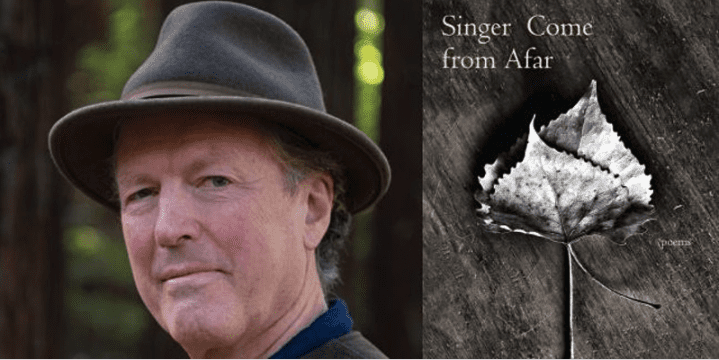
“Speaking for the Wild” by Kim Stafford
There is so much to distract us these days from our primary task, which is to renew honorable kinship with the Earth. Yes, economics, politics, justice, health—all utterly essential. But as a poet, I keep circling back to the forests that raised me, the creatures that taught me, the ways of the wild that were our cradle as human kind and now require us to pay attention or we are through. And I want to share two poems in this spirit from my book Singer Come from Afar, which came out from Red Hen Press this month.
So we writers are called to testify for a creature, a place, a way of happening in water, wind, and fire. When I was Oregon’s poet laureate for a couple years, I was inspired by something my predecessor said, the Navaho-Wasco poet Elizabeth Woody: “The more I do poetry, the less it’s about what the poem is, and the more about who the poem serves.” That thrilled me, and thereafter I found myself writing in the spirit of service.
When asked by an editor for a poem about the totem animal of the Salish Sea, I was about to leave on a journey, this testament came pouring forth:
Earth Totem
Dorsal cedar dressed in moss where the village stood.
Crest carved fresh and proud, the clan not yet defeated.
White on black the color of starlight, high and old.
Glittering where the sea’s back breaks open. In the strait,
their formation ancestors could use to teach children
the ways of courage, certainty, persistence.
Thriving where King Salmon thrive, the throng
charging in their own endemic wave through waves,
splitting the eternal, binding what flows, braiding
salt to salt in a shape the old ones carved in stone,
up from the hidden, forth through the hungry,
diving, secret, swallowed by the sea.
Who will lead us into the future if not these?
Who will teach us high respect, if not
the whales that prey on whales? Who
among us can dance like that, in storm
or cold, driving through shoals of silver
where all the little lives glitter in beautiful fear?
Hold honor of ancestors in our keeping, destiny of children,
eel and clam, eagle and heron, bear and frog, all the woven
hungers nourishing us by their vigor, their abundant life.
How can we meet our children’s eager, brimming gaze
if we let the orca essence falter, barren, hungry, gaunt, if
our pod of treasures dive, never to return?
I feel these questions in the air, pelting us like rain.
A second poem exemplifies something that keeps happen on my pages, a life from the Earth speaking counsel us the human tribe—to me, and through me to my kin. In my twenties I read a lot of Old English poetry, which is filled with voices from the wild speaking riddles, posing questions, casting forth clues and hints of all kinds, a kind of pagan verve the monk scribes couldn’t help but put into their precious books. Here is one iteration of this urge, where an old tree teaches me about the life story it lives, as I will in my turn:
Lessons from a Tree
Seed split. Root sprout. Leaf bud.
Delve deep. Hold fast. Reach far.
Sway. Lean. Bow. Loom.
Climb high. Stand tall. Last long.
Grow. Thicken. Billow. Shade. Sow seed.
Rise by pluck, child of luck,
lightning-struck survivor.
Burn. Bleed. Heal. Remember. Testify.
Nest. Host. Guard. Honor.
Fall. Settle. Slump.
Surrender. Offer. Enrich.
Be duff. Enough.
With a friend who plays harp, I made a little film with this poem:
Love to all,
Kim Stafford
8 April 2021


Kim Stafford, a gift to Gaea. As is NCI.